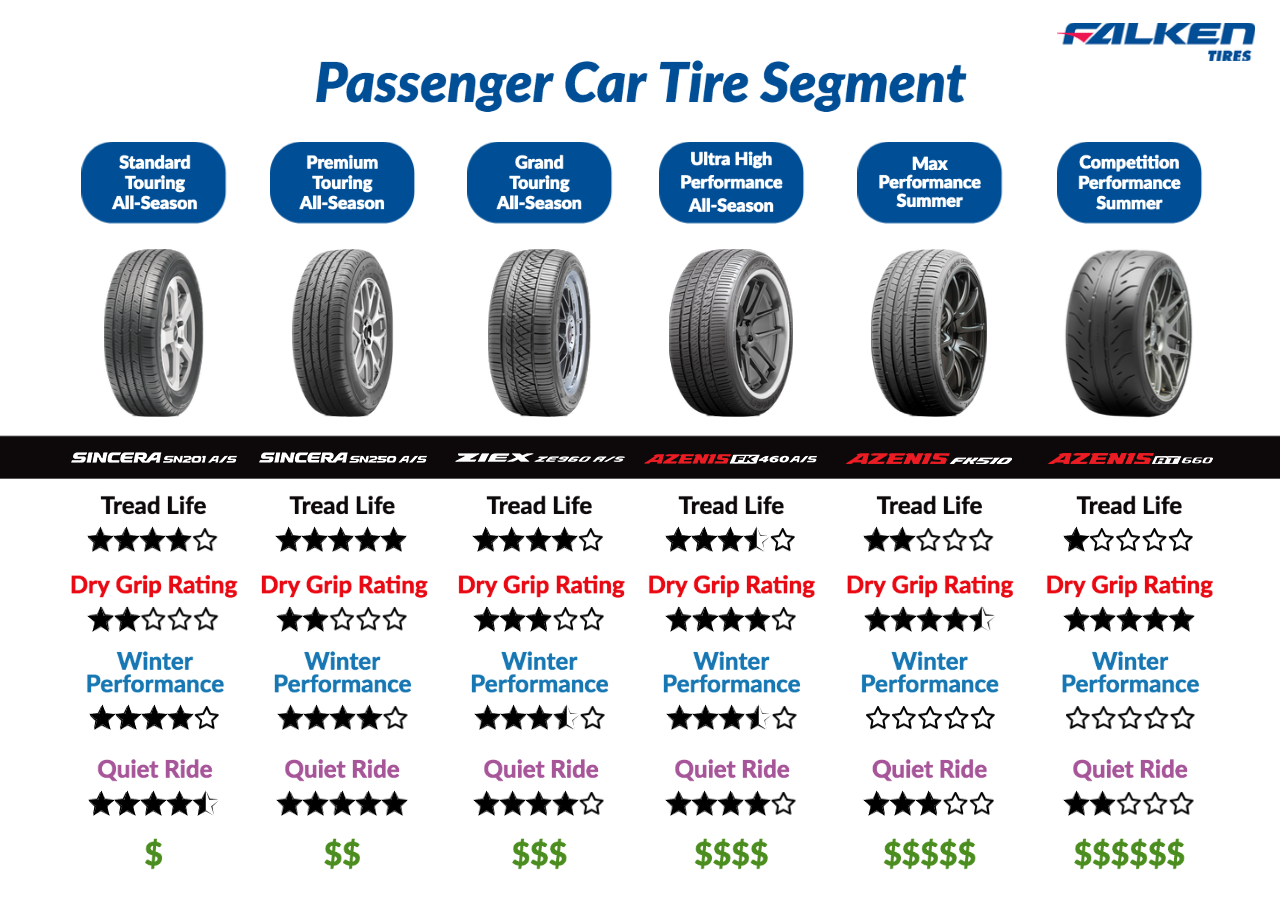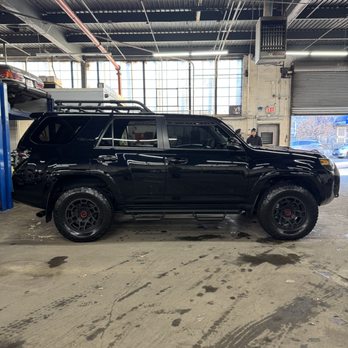Best Tires For All-season Performance
There’s an intriguing challenge in choosing tires that perform effortlessly through all four seasons. The evolution of all-season tires has seen remarkable innovations designed to balance the needs of wet, dry, and mild winter conditions, which often seems like walking a tightrope. For those in the know, these tires are a marvel of engineering, providing reliability and performance across weather extremes.
The quest for the ideal all-season tire traces back to manufacturers’ relentless pursuit of versatility over decades. Research shows that about 70% of drivers prefer all-season tires, reflecting their adaptability and convenience. Modern designs cleverly incorporate specialized tread patterns and rubber compounds that enhance grip without compromising durability, harmonizing the needs of diverse drivers around the globe.
- Michelin Defender T+H: Known for long-lasting durability and superior wet grip, making it a reliable choice for varied weather.
- Continental PureContact LS: Offers excellent all-season traction and smooth ride quality.
- Pirelli Cinturato P7 All Season Plus: Provides comfort with low road noise and efficient handling.
- Goodyear Assurance WeatherReady: Features unique tread patterns for optimal performance in rain and light snow.
- Bridgestone Turanza QuietTrack: Prioritizes a quiet, comfortable ride with high wet/dry traction.

Best tires for all-season performance
When it comes to choosing tires that can handle every season, there are some top contenders. These tires are designed for a mix of weather, from sunny days to rainy roads. One popular choice is the Michelin Defender T+H, known for its long-lasting durability. Another great option is the Continental PureContact LS, which many drivers love for its smooth ride. To help make decisions easier, some drivers turn to reviews, ensuring they get the best fit for their needs.
Let’s break down some features that make these tires stand out.
- The Michelin Defender T+H offers a reliable grip on wet roads.
- The Continental PureContact LS has excellent all-weather traction.
- The Pirelli Cinturato P7 All Season Plus is quiet and comfortable to drive.
These features make them appealing to many drivers looking for peace of mind on the road. Each brand brings its own strengths to the table.
Besides great performance, another factor to consider is cost. Tires, like the Goodyear Assurance WeatherReady, are pricier, but they offer premium features. The Bridgestone Turanza QuietTrack is an investment, yet its technology promises a peaceful ride. Some drivers find it worth the extra money for the safety and comfort these tires provide. Finding the right balance between cost and performance is key for many buyers.
Additionally, understanding how these tires perform across different conditions is important. For example, in colder climates, an all-season tire must handle light snow. It’s impressive how manufacturers have engineered these to maintain grip during winter. Meanwhile, in warmer areas, durability on hot pavement matters most. Overall, all-season tires are built to adapt, offering flexibility for drivers everywhere.
1. Michelin Defender T+H
The Michelin Defender T+H is known for its long-lasting performance on the road. Many drivers appreciate its ability to handle both wet and dry surfaces with ease. Its tread design helps provide a stable ride, even during heavy rain. The tire’s durability often exceeds expectations, making it a popular choice for daily commuting. This mix of durability and safety makes it a standout option.
One of the key features is its excellent mileage warranty, which assures drivers of its long-term value. Compared to average tires, the Defender T+H often lasts longer. This means fewer trips to the tire shop, which is a bonus for busy families. Also, the tire’s design contributes to fuel efficiency, saving money over time. With continual road use, the cost-effectiveness of this tire becomes quite noticeable.
Beyond performance, comfort is another reason people choose these tires. The Michelin Defender T+H delivers a smooth ride, reducing road noise significantly. This quieter ride can make long trips more enjoyable for everyone in the car. Its adaptive design helps balance comfort with control, giving drivers a relaxed feel behind the wheel. This approach ensures a consistent driving experience.
While the Michelin Defender T+H offers many benefits, it’s wise to consider all-season tire options. However, not every tire can offer the same mix of durability and comfort. Side-by-side comparisons show how this tire often outshines others in its class. By understanding features and reviews, drivers can make an informed decision. Exploring various choices helps ensure the best fit for specific driving needs.
2. Continental PureContact LS
The Continental PureContact LS is a favorite for many drivers due to its top-notch performance. This tire is specifically designed to offer smooth handling on slippery roads. It uses advanced traction technology, which keeps cars steady, even in unexpected weather. Whether it’s rain or light snow, the PureContact LS adapts with ease. Drivers can feel secure knowing their tires are ready for any situation.
A standout feature of this tire is its impressive tread life. While driving, the PureContact LS demonstrates an excellent wear pattern, prolonging its usability. Drivers who travel long distances will especially appreciate its efficiency. Combining durability with performance, these tires meet the demands of those who value longevity. Less frequent replacements mean more savings in the long run.
Comfort is at the core of the PureContact LS, and it excels in this area. The tire’s design helps absorb road bumps, providing a smooth ride for everyone in the car. It significantly reduces road noise, making each journey quieter and more pleasant. This is especially beneficial for long road trips, where noise can become a distraction. Such comfort features make it suitable for everyday driving.
Comparing the PureContact LS with other all-season tires reveals its many advantages.
- Consistent all-weather grip
- Enhanced fuel efficiency
- Extended tread life
These benefits highlight why it ranks highly among experts and drivers alike. Understanding its features helps make an informed decision when selecting tires. Given its capabilities, this tire proves to be a reliable choice for varied driving conditions.
3. Pirelli Cinturato P7 All Season Plus
The Pirelli Cinturato P7 All Season Plus is a tire that combines performance with comfort for many drivers. Its design focuses on delivering a smooth ride, making it a reliable choice for everyday use. Pirelli has engineered this tire to perform well in both wet and dry conditions. When roads are slick, the tire maintains its grip effectively, providing enhanced safety. This feature stands out, especially during unexpected weather changes.
A notable characteristic of the P7 All Season Plus is its fuel efficiency. Pirelli has optimized the tire’s profile to reduce rolling resistance, helping save on fuel costs. This means drivers can travel longer distances without frequent gas stops, which is both economical and convenient. Alongside efficiency, its longer tread life makes it a cost-effective option over time. Drivers looking for value will appreciate these benefits.
Comfort is another major advantage of this tire. It absorbs road impacts well, ensuring a quieter and softer ride. Passengers feel less of the road’s bumps, which is perfect for long drives or daily commutes. Noise levels are reduced too, allowing for peaceful journeys. These comfort features contribute significantly to its popularity among drivers.
The versatility of the Pirelli Cinturato P7 All Season Plus also deserves attention.
- Adaptability to different road surfaces
- Smooth handling during cornering
- Durable construction for better mileage
These attributes make it a favorite for those who encounter various road conditions. Choosing a tire like this caters to both performance and comfort needs. As a result, it appeals to a wide range of driving preferences.
This tire doesn’t just promise impressive performance but also upholds Pirelli’s reputation for quality. It’s crafted to meet the demands of diverse weather and road conditions. This makes it a dependable option for many drivers who value reliability and peace of mind. Its blend of comfort, safety, and efficiency ensures it stands out in the competitive tire market. Overall, this tire offers a balanced experience for everyday driving.
4. Goodyear Assurance WeatherReady
The Goodyear Assurance WeatherReady tire is designed to tackle all weather conditions, providing peace of mind to drivers. Its unique tread pattern effectively channels water away, reducing the risk of hydroplaning. These tires excel in maintaining traction, even on slippery roads. As seasons change, drivers can trust in its consistent grip and control. This reliability makes it a favorite choice for those who experience varied weather throughout the year.
A feature that stands out is its all-weather readiness, offering solid performance in both sunshine and snow. Goodyear’s Weather Reactive Technology allows the tire to adapt to temperature changes. In cold conditions, the tread remains flexible, enhancing the driving experience. The added traction helps navigate icy or snowy roads with confidence. This adaptability ensures drivers are prepared for anything nature throws their way.
Comfort is another critical factor for the Goodyear Assurance WeatherReady. The tire provides a smooth, quiet ride due to its specialized rubber compound. Road noise is minimized, allowing passengers to enjoy conversations without disruption. This can make a significant difference on long trips, turning potentially tiring drives into pleasant journeys. Many customers have praised this aspect in their reviews.
This tire also offers benefits in terms of longevity and value. It is crafted to have a long tread life, reducing the frequency of replacements. Drivers appreciate how this aspect leads to cost savings over time. Additionally, it balances performance with durability, proving to be a practical investment. Many find the initial cost justified by the lasting quality and dependable performance.
Table showcasing features:
| Feature | Benefits |
|---|---|
| Weather Reactive Technology | Adapts to temperature changes for enhanced grip |
| Unique Tread Pattern | Reduces hydroplaning and boosts wet-road safety |
| Specialized Rubber Compound | Provides a quieter, more comfortable ride |
Overall, the Goodyear Assurance WeatherReady combines technology with practicality. For those seeking a versatile tire, it offers confidence in various road conditions. Balancing adaptability and comfort, this tire suits drivers who value both reliability and efficiency. Its performance across different weather situations sets it apart in the all-season tire lineup. Drivers can count on it to deliver a smooth, secure ride year-round.
5. Bridgestone Turanza QuietTrack
The Bridgestone Turanza QuietTrack is a tire designed with comfort and quietness in mind. It’s perfect for those who enjoy long drives without the distraction of road noise. The QuietTrack technology specifically targets noise reduction, ensuring a peaceful ride. This tire also provides excellent traction on wet and dry surfaces alike. Drivers find it reliable no matter the weather conditions they face.
With its advanced rubber compound, the Turanza QuietTrack offers impressive durability and tread life. This means it doesn’t wear out quickly, saving drivers money on replacements. Bridgestone has added features that enhance fuel efficiency, making it a wise choice for environmentally-conscious drivers. The tire maintains its grip and control over time, ensuring safety and stability. These attributes make it ideal for long-term use.
A significant advantage of this tire is its ability to balance comfort with performance. While it’s known for providing a smooth, quiet ride, the Turanza QuietTrack doesn’t compromise on handling. It responds well to steering, even at high speeds, giving drivers confidence during their travels. This versatility makes it suitable for both city drives and highway cruising. Many users consider it an all-around performer.
Key features include:
- Noise-reducing technology for a quiet ride
- Longevity and durability for extended use
- Enhanced traction and handling on various surfaces
Table showcasing performance data:
| Performance Features | Ratings |
|---|---|
| Noise Reduction | High |
| Tread Life | Long-lasting |
| Wet Traction | Excellent |
The Bridgestone Turanza QuietTrack continues to impress with its focus on creating a refined driving experience. It’s especially helpful for those who spend a lot of time on the road. Whether tackling daily commutes or embarking on a road trip, it offers a reliable and comfortable journey. When considering all-season tires, this option provides a commendable mix of quietness, durability, and performance. Drivers can trust its consistent delivery in varied conditions.
Factors to consider when choosing all-season tires
Selecting the right all-season tire involves several key considerations to ensure you’re making the best decision for your vehicle’s performance. One of the first things to look at is tread life, which affects how long your tires will last before they need replacement. Higher tread life means more miles and less frequent trips to the tire shop. Reviews from other drivers can provide insight into how long a tire typically lasts under regular conditions. This aspect can lead to cost savings over time.
Another essential factor is traction in both wet and dry conditions. All-season tires should offer a good grip on both dry and damp roads, so checking ratings for each brand can help you choose wisely.
- Wet Traction: Reduces risk of slipping in rain
- Dry Traction: Provides stable control on sunny days
Reading reviews or lab tests about these features can give a clearer idea of their effectiveness. This ensures a safer driving experience year-round.
Comfort is also crucial, as it impacts the overall driving experience. Tires designed to minimize noise and enhance smoothness are often preferred by those who spend lots of time on the road. The quieter the ride, the more enjoyable longer journeys become for everyone in the car. Options with specialized rubber compounds often perform better in this area. This detail might make a difference especially during road trips.
The next point to consider is fuel efficiency because it affects your fuel consumption rates directly. Some tires are built specifically to reduce rolling resistance, thus enhancing gas mileage and saving money at the pump. Checking whether a tire brand focuses on eco-friendly features helps select an environmentally conscious option. Reduced rolling strain means less energy used while moving forward. Choosing an efficient model contributes positively toward reducing overall fuel expenses.
Tires also need versatility across different weather conditions—light snow included—to prove their adaptability as true all-weather options.
- Siping enhances winter performance
- M+S (Mud and Snow) rated designs excel here too
. Understanding expected local climate types allows buyers better tailor selections suited specifically toward such needs! Drivers benefit from approaches that anticipate potential variations within anticipated usage areas ensuring readiness no matter what seasonal patterns emerge.
Advantages of all-season tires
All-season tires offer a blend of benefits, making them a popular choice for many drivers. One key advantage is their ability to perform in a variety of weather conditions. They can handle light snow, rain, and dry roads with ease. This flexibility means you don’t have to switch tires between seasons, saving time and effort. Their adaptability is a huge plus for those experiencing changing weather patterns throughout the year.
Convenience is another major perk of choosing all-season tires. Since they’re designed for year-round use, drivers do not need to own separate sets for each season. It eliminates the hassle of changing tires when seasons transition. This is especially handy for individuals who don’t have space to store extra tires. The practical aspect appeals to many who seek simple, hassle-free solutions for their vehicles.
All-season tires also tend to be more cost-effective compared to buying specialized tires for different seasons. Investing in one set instead of multiple saves money over time. While they may not surpass performance-specific tires in extreme conditions, they are versatile enough for most driving needs. This balance of affordability and performance meets the needs of budget-conscious consumers. Many find it a wise financial choice considering the benefits.
Furthermore, these tires generally offer good fuel efficiency. All-season tires are often designed to reduce rolling resistance, which helps improve gas mileage. Better fuel efficiency means fewer trips to the gas station, saving money in the long run. For drivers looking to cut costs on fuel, this is a significant advantage. Reducing the amount of energy needed to move forward boosts overall economy.
Finally, all-season tires provide better longevity than some seasonal tires. Their construction is aimed at durability, allowing them to withstand different environmental pressures. While they won’t last forever, their extended tread life makes them an appealing option. With proper maintenance, they can serve drivers well over numerous miles. This long-lasting quality proves beneficial for many motorists seeking lasting performance.
Performance of all-season tires in diverse conditions
All-season tires are crafted to handle a variety of driving conditions, making them a versatile choice. In wet conditions, they offer excellent traction and control, which is crucial for safe driving. The tread design typically features deep grooves, quickly channeling water away from the tire. This reduces the risk of hydroplaning and helps maintain grip on slippery roads. Many drivers feel confident navigating through rainstorms with these tires.
During dry conditions, all-season tires continue to deliver reliable performance. They grip the road well, providing stable handling and smooth rides. Their rubber compounds are balanced to offer both flexibility and durability. This ensures that the tire remains responsive even during warmer months. Drivers can enjoy secure handling and good braking performance on dry pavement.
When it comes to winter conditions, all-season tires can manage light snow fairly well. They are designed with siping, which are small slits in the tread blocks. This feature enhances grip on snowy and icy surfaces. However, they might not be as effective as winter tires in deep snow and extreme cold. For areas with harsh winters, having a dedicated set of winter tires could be beneficial.
Table of performance factors:
| Condition | Performance |
|---|---|
| Wet Roads | High traction, reduces hydroplaning |
| Dry Roads | Stable handling, durable |
| Light Snow | Enhanced grip with siping |
In addition to their weather adaptability, all-season tires also handle well on different types of terrain. From city streets to highways, they provide a smooth and controlled ride. Their versatility makes them suitable for various driving environments. Whether navigating through urban traffic or cruising on open roads, these tires offer dependable performance. The consistent quality across diverse conditions is a major draw for many drivers.
For those living in regions with moderate weather changes, all-season tires offer a balanced solution. They provide a mix of features that cater to different conditions without needing frequent tire changes. This convenience, combined with their performance capabilities, makes them an attractive option. Many drivers appreciate the peace of mind that comes with knowing their tires are ready for almost any situation. Overall, they are a practical and reliable choice for year-round driving.
All-season tires vs. Season-specific tires: A comparison
When choosing tires, drivers often weigh the benefits of all-season tires against season-specific ones. All-season tires are designed to handle a variety of conditions, making them versatile for most driving climates. This adaptability means they work decently in both warm and cold weather. However, they might not excel in extreme conditions where specialized performance is needed. The convenience of having one tire set for the entire year is a huge selling point for many.
On the other hand, season-specific tires, like summer or winter tires, are engineered for optimal performance in particular climates. Winter tires, for instance, have a tread design and rubber compound that grips better in snow and ice. This makes them superior in very cold temperatures compared to all-season options. Summer tires shine brightest during dry and hot conditions, offering enhanced traction and handling. Their focus on specific conditions often results in better safety and performance.
Cost is another factor when comparing these tire types. Initially, buying all-season tires might seem more economical, as they eliminate the need for multiple sets. Yet, season-specific tires can last longer because each set is used solely during its intended period. Depending on climate, investing in multiple tire sets could prove cost-effective over time. Weighing the upfront cost versus longevity can help in decision-making.
Here’s a simple comparison table:
| Tire Type | Advantages | Limitations |
|---|---|---|
| All-Season | Versatile, no need to change with seasons | Not optimal for extreme climates |
| Summer | Excellent in dry and warm conditions | Poor performance in snow and ice |
| Winter | Great grip in snow and cold | Not suitable for warm temperatures |
Convenience is often a significant factor for those who choose all-season tires. They save the hassle of seasonal changes and storage of extra tire sets. This aspect makes them appealing, especially for urban living where space can be limited. However, for those who experience extreme weather, the peace of mind brought by season-specific tires can’t be overlooked. It’s all about balancing convenience with need.
Ultimately, deciding between all-season and season-specific tires depends largely on where you live and your driving habits. In mild climates, all-season tires provide an adequate solution for year-round use. But in places with harsh winters or hot summers, investing in season-specific tires could enhance safety and performance. Understanding the strengths and weaknesses of each type helps make an informed choice. The best tires for you will cater directly to your driving conditions and lifestyle.
Frequently Asked Questions
Choosing the right tires is critical for safe and efficient driving. Many drivers have specific questions about the performance and selection of all-season tires. Here, we address common inquiries to help you make an informed decision for your vehicle’s needs.
1. What are the key features of all-season tires?
All-season tires are designed to offer a balanced performance in different weather conditions. They feature special tread patterns for water evacuation, reducing the risk of hydroplaning on wet roads. Typically, manufacturers integrate siping, which improves traction on light snow and ice, enhancing safety in varied environments.
Unlike season-specific tires, they maintain consistent handling and relatively low road noise, offering comfort for everyday driving. Their construction uses a blend of rubber compounds to ensure longevity, making them suitable for those who want convenience over frequent tire changes. This makes them an attractive option for many drivers.
2. How do all-season tires compare to winter tires?
All-season tires provide decent traction in light winter conditions but aren’t designed for heavy snow or extreme cold. Winter tires have deeper treads and are made from softer rubber for better grip in freezing temperatures, enhancing vehicle control on icy roads and during harsh winter conditions.
However, all-season tires are more versatile throughout the year, eliminating the need for seasonal tire changes. While they offer a convenient option, for those in regions with severe winters, investing in a set of winter tires can significantly improve safety during those months. Consider your local climate when choosing between the two.
3. Are all-season tires suitable for off-road driving?
All-season tires are primarily designed for paved roads and aren’t typically suitable for rugged off-road terrains. They lack the aggressive tread patterns seen in off-road or all-terrain tires, which are needed to grip loose surfaces like dirt or mud effectively. This makes them less effective in off-road conditions.
If off-road driving is a regular activity, consider investing in specialized off-road tires that offer better durability and traction on unpaved surfaces. Depending on terrain demands, these tires provide enhanced protection against punctures and sidewall damage. Always choose tires based on where you plan to mostly drive.
4. How often should all-season tires be replaced?
The lifespan of all-season tires varies based on driving habits, road conditions, and maintenance. On average, they can last between 50,000 to 70,000 miles. Regularly checking tread depth and tire condition is essential for maintaining optimal performance and safety on the road.
Proper tire care, including rotating, balancing, and aligning, can prolong their lifespan. It’s wise to consult your tire manufacturer’s guidelines or a trusted tire professional to determine the best schedule for replacements. Staying attentive to tire health ensures better driving safety and efficiency.
5. What are some tips for maintaining all-season tires?
To extend the life of your all-season tires, routinely check air pressure and ensure it aligns with the manufacturer’s recommendations. Proper inflation helps maintain even tread wear and improves fuel efficiency. Regular rotations, typically every 5,000 to 7,000 miles, ensure even wearing across all tires.
Additionally, keep an eye on tread depth using a penny or tire gauge. If a tire shows signs of uneven wear, it may indicate alignment or suspension issues. By keeping up with these simple maintenance steps, you can maximize performance and safety. Maintaining good tire health is essential for achieving longevity and reliability.
In Summary
Navigating the world of all-season tires requires understanding their benefits and limitations. These tires offer a practical solution for drivers seeking convenience and versatility across diverse conditions. While they may not excel in extreme weather, their balanced performance makes them a popular choice for many. Experts appreciate their ability to provide a reliable driving experience year-round.
Choosing the right tire involves consideration of local climate, driving habits, and individual needs. Whether opting for the practicality of all-season tires or the specialized performance of seasonal ones, making an informed choice enhances safety and efficiency. Engaging with these factors ensures a tire decision that aligns with your driving environment. Ultimately, informed choices lead to safer and smoother journeys.



